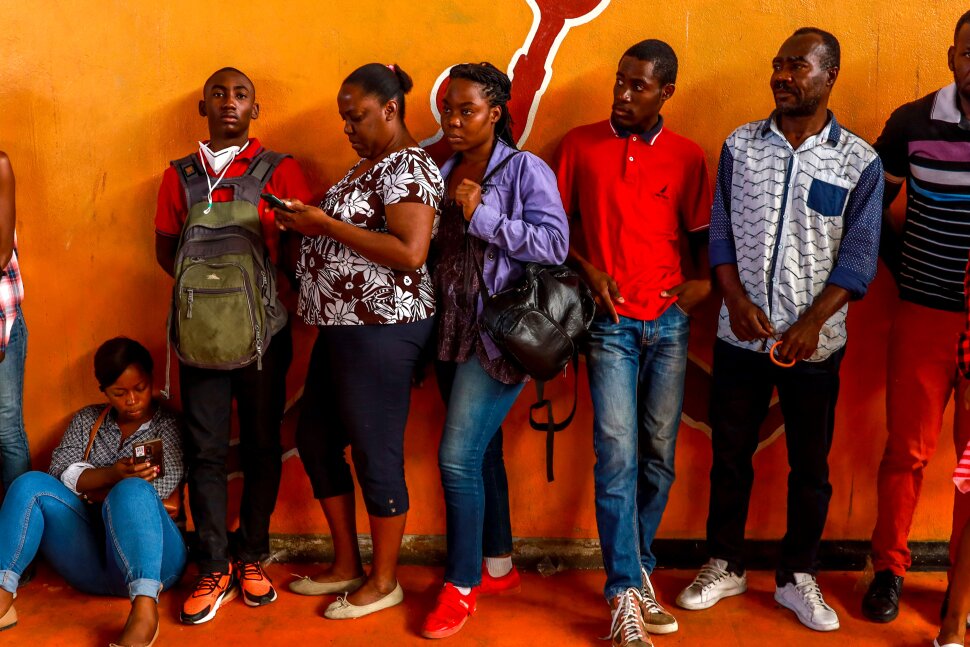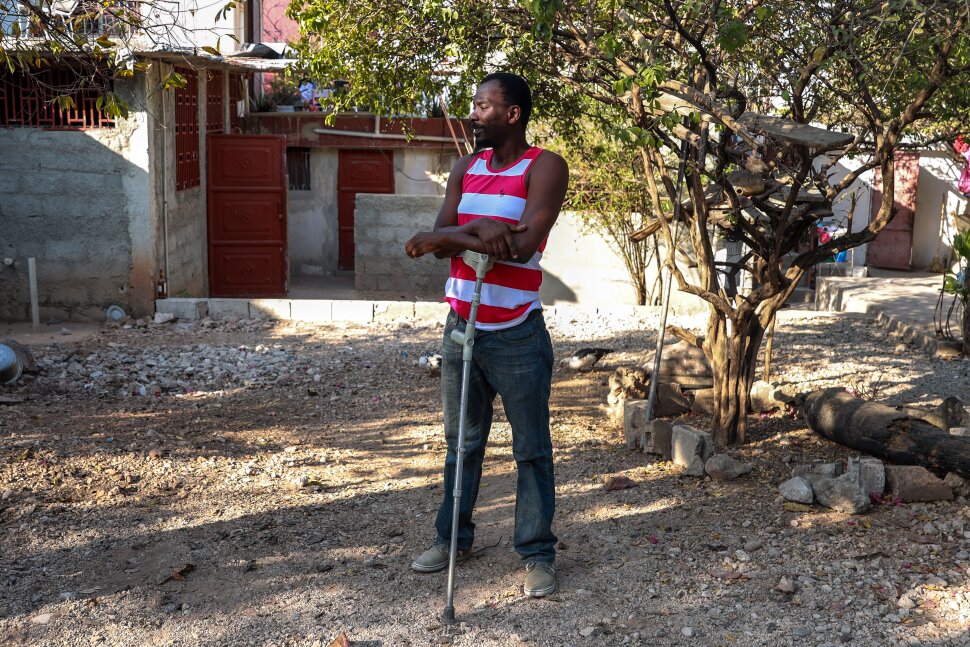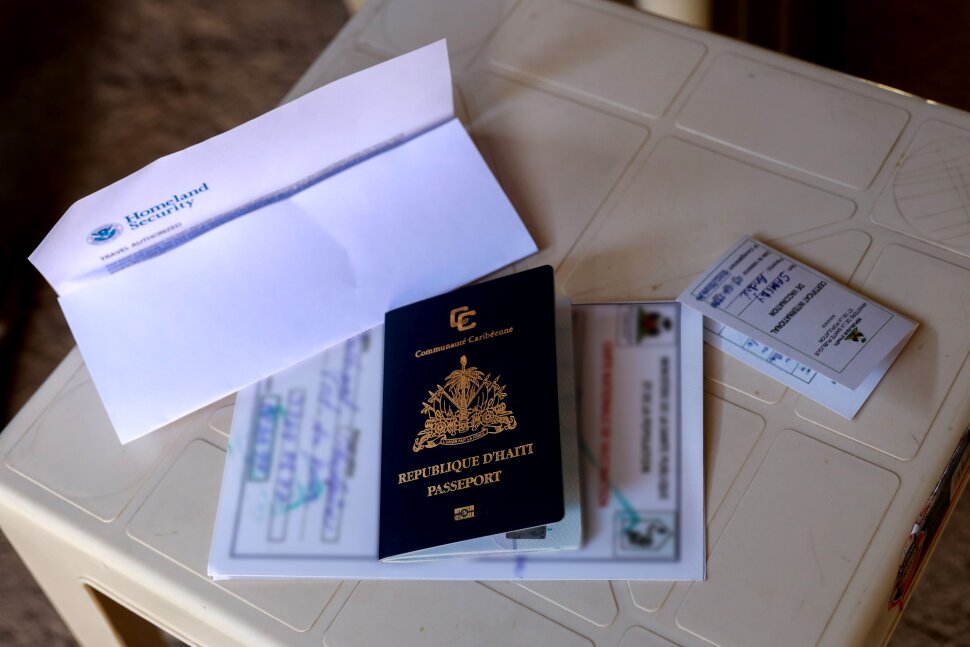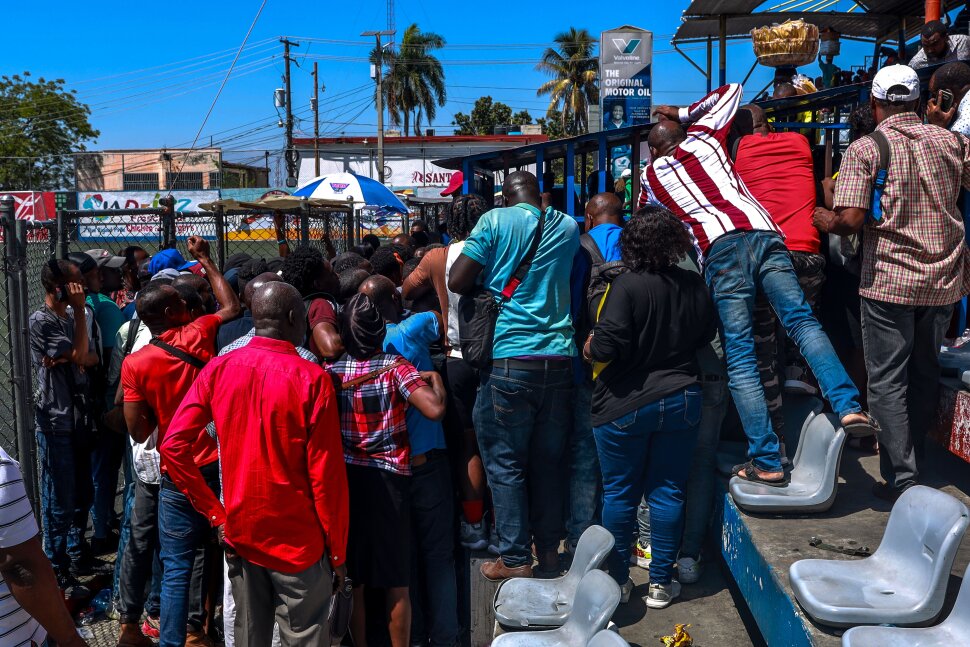This post is also available in: Kreyol
This story was produced with the support of the Round Earth Media program of the International Women’s Media Foundation in partnership with Woy Magazine.

PORT-AU-PRINCE, Haiti — Andre Samedi was briefly held at gunpoint last year after picking up his car from customs. The assailants stopped the 43-year-old in Canaan, a small town on the outskirts of Haiti’s capital of Port-au-Prince, and drove away with him. They eventually decided to let him go, but got away with the 2003 Nissan Pathfinder.
“Since then, I’ve been very scared,” says Samedi, who owns a shipping and electronic sales business. “I can’t go out often and only do so if it’s an emergency. When I do go out my heart races and I’m very stressed. The experience has left me traumatized.”
Samedi is one of tens of thousands of Haitians who applied for a new U.S. immigration program that President Joe Biden announced in early January 2023. The program, known as humanitarian parole, allows Haitians, Cubans, Venezuelans and Nicaraguans to apply to move to the U.S. for a two-year stay.
But the popular program has proved difficult to access for many Haitians, some of whom complain about language barriers, technology challenges and financial obstacles. Many say the process of acquiring mandatory documents for the program has become frustrating and at times frightening, with violence breaking out at passport centers.

(Photo: YVES OSNER DORVIL / IWMF)
A Devastating Downward Spiral
Haitians are flocking to leave their country during what one U.N. official has called a time of “unprecedented insecurity.” For several years, armed gangs in the Caribbean nation have fought for control of neighborhoods around Port-au-Prince, using methods like kidnapping and rape to cement their dominance. The violence has emerged during a time of political gridlock between U.S.-backed Prime Minister Ariel Henry and opponents who contest his legitimacy, a conflict extreme enough to prompt the U.N. to call for an international “specialized support force” to help quell it.
The violence, as well as the remnants of the devastating 2010 earthquake and a less deadly, but still serious, earthquake in 2021, has taken a severe economic toll. According to the U.N. World Food Program, 4.9 million Haitians – nearly half the country – do not have enough to eat. The United Nations children’s agency UNICEF recently found that more than 100,000 children there are at risk of starving to death.
Many Haitians have also been forced from their homes. Between June and August 2022, approximately 113,000 people were internally displaced in the country, according to a report by the International Organization for Migration.
Since the humanitarian parole effort was announced in January, at least 39,000 Haitians have been approved for the program, which they simply call “Biden.” The program, which was previously rolled out for Afghans and Ukranians, gives immigrants temporary legal status in the U.S. but no path to citizenship. It requires sponsorship by someone residing in the United States.
The humanitarian parole program was presented as an alternative for those wishing to seek asylum at the border, which many Haitians have tried – and failed – to do in recent years.
Since the start of the COVID-19 pandemic, the U.S. has deported thousands of Haitians and other migrants who crossed the border from Mexico trying to seek asylum without due process based on Title 42, a controversial policy that allowed for the expedited deportation of asylum-seekers allegedly due to public health concerns. The policy expired in May, but the Biden administration recently released new guidelines to take their place.
Under new restrictions, asylum-seekers who travel through a country to get to the U.S.-Mexico border without applying for asylum in that country first will be deported and ineligible to apply for asylum to the U.S. for five years, with exceptions for unaccompanied children and those in imminent danger. Migration activists argue that these measures strip people of the right to apply for asylum at the border, rendering thousands of potential asylum-seekers ineligible.
Obstacles to Legal Escape
Haitians who qualify for humanitarian parole can come to the U.S. through the border or by plane. However, many of those who have made it that far say they’ve had to go through a daunting application process to get there.
The first challenge is finding a sponsor. The program requires sponsors to be either a U.S. citizen, a legal permanent resident or have temporary protected status with proof of income. The sponsor doesn’t need to be related to the applicant.
Magalie Delmas says the requirements are keeping her from applying for humanitarian parole. In 2018, she decided to leave Haiti for Chile, where her brother was already living. But a little more than three years later, Magalie, her sister, brother-in-law and other friends decided to make the trek from Chile to the U.S.-Mexico border, where they were deported back to Haiti.
Magalie moved back home to live with her mother in her hometown of Thomassique, a small rural municipality near the border with the Dominican Republic. She thought about applying for humanitarian parole through a friend or a brother in the U.S., but then realized they couldn’t be sponsors due to income requirements.
So in early May, she moved back to Chile.
“I arrived two weeks ago and am living again with my sister,” Delmas says. “The seasonal fruit-picking work here doesn’t start until January, so in the meantime I will sell clothes to make some money.”
Finding reliable information on the program among a deluge of online sources and information spread through word-of-mouth is another obstacle.
Jeanine Petigny, a retired elementary school teacher in New York City, was skeptical at first when she heard about the new humanitarian parole program. “I thought it was a scam,” she says.
Petigny sought reliable information on the process via the Haitian Ladies Network, a popular Haitian social media page for Haitian women to share resources, news and even memes. In January, once she was convinced of the process, she applied for her cousin’s son, a 30-year-old whom she has been supporting financially for years.
“I am still hopeful,” says Petigny, who is still waiting to see if her application is approved. “I keep checking my email all the time hoping for a positive response.”
Petigny was fortunate that she could navigate the application process, but not everyone is so lucky. The process requires access to an email address, a mobile phone and stable internet. While most Haitians have a cellphone, they must navigate an online application that is available only in French, English and Spanish, posing serious access issues for Haitians fluent only in Haitian Creole, the language most widely spoken in the country.
Immigration advocates have also argued that the facial recognition technology in the application process is biased. Applicants must upload their picture to the application to secure an appointment, but there are reports that the program doesn’t register darker skin tones easily, making it impossible to upload the images.

But of all the obstacles in the way of applying for the program, obtaining a passport is the biggest challenge. While Venezuela, another country eligible for the program, has extended the validity of expired passports to allow people to travel – saving applicants time and money – Haiti has instead opened more passport request centers, creating 16 more, including in three stadiums.
However, the measures have not been enough to ensure an orderly and timely furnishing of passports, and the process has been plagued by long lines and occasional violence.
In March, Haiti’s Office of Citizens’ Protection, an independent government ombudsman charged with monitoring abuses, issued a statement deploring the beatings and the loss of life at the passport centers – which some have pinned on the Haitian National Police – and called for an investigation.
Sarah Mathieu, a 27-year-old who works for an international nongovernmental organization, saw some of the chaos firsthand. She says the first time she tried to renew her passport at an immigration center in Port-au-Prince, there were so many people it reminded her of Carnival.
“Some people were climbing over the gate,” she says. “Others were paying to get through the gate. It was a real ordeal – a fight that can end your life because so many people were pushing each other. The police were beating people and shooting in the air and using tear gas to disperse the crowd. “
The Office of Citizens’ Protection has also criticized the “inaccessibility and inefficiency” of the passport process, which it said opened the way “for all sorts of exploitation, extortion, and blackmail.” And it acknowledged that police officers and passport officials are charging people more than the official prices for passports.
Indeed, several Haitians say retrieving their application documents has simply become unaffordable.
Fritznerson Dely, a 26-year-old photographer and school aide, applied for the humanitarian program on Feb. 1. Dely lives in Gonaives, a city 92 miles north of Port-au-Prince, where he had to travel to get his passport after he failed to get it in his hometown, where scammers and long lines made it impossible.
“I’ve been in Port-au-Prince now for weeks trying to get my passport, but everything tied to travel documents now is so expensive,” says Dely.
In total, he has spent at least $198, or 30,500 Haitian gourdes, applying for “Biden,” which included submitting things like a birth certificate, a certificate of good standing and vaccination records. Fritznerson earns about $100 a month as a school aide. He supplements his income with inconsistent freelance photography gigs which, on a good month, could earn him around $600.
For a young person like Dely, these costs are prohibitive. But he is still determined to leave because of the lack of opportunities and insecurity.
Links Between the Past and Present
The U.S. has had a long, fraught history with Haiti, which experts argue has contributed to the country’s current struggles. The U.S. military invaded Haiti – the site of the world’s only successful slave revolt of its kind – in 1915 and occupied it until 1934, sparking a rebellion and killing more than 15,000 Haitians during its time there. The U.S. supported the 1957 election of Francois Duvalier, a murderous autocrat who ruled the country until 1971, as well as his son, Jean Claude Duvalier, who shared his father’s intolerance for opposition, ruling with an iron fist until 1986. The U.S. would go on to intervene in the elections and coup d’états of several successors.
Haitians have often been deported from the U.S., even during particularly dire times in their country. In the early 1990s, before the U.S.-led war on terror, the U.S. military prison in Guantánamo Bay, Cuba, was used to hold around 40,000 Haitian asylum-seekers who had tried to escape Haiti by sea after Jean-Bertrand Aristide, the country’s first democratically elected president, was overthrown in a Haitian military-led coup d’état. Some involved in the coup, which ushered in a period of human rights abuses and later precipitated U.S. military intervention and occupation of Haiti, had been trained in the U.S. and were on the CIA’s payroll.

(Photo: YVES OSNER DORVIL / IWMF)
In September 2021, thousands of Haitians attempting to claim asylum gathered under a bridge in Del Rio, Texas, after crossing the border. Before their deportation, some were herded, chased and threatened by U.S. Border Patrol agents, moments captured in widely circulated images. The deportations caused Dan Foote, then the U.S. special envoy to Haiti, to resign from his post. In his resignation letter, he called the Biden administration’s deportations of Haitians “inhumane” and “counterproductive,” and noted the “catastrophic” consequences of outside interventions in the country.
Still, many Haitians have found a way to stay in the U.S, some through temporary protected status offered after the 2010 earthquake, and others through the same program launched recently as a result of the current violence. Today, the U.S. is home to over 1 million Haitians, with most living in New York, Florida, New Jersey, Pennsylvania and Boston.
Samedi joined them on March 22, after applying for the humanitarian parole program in early January. He was welcomed by his brother, who sponsored his application, and felt grateful for a newfound sense of safety.
“I am happy to be in the U.S. because I have many family members here who had left and couldn’t return to visit because of the difficulties at home,” he says.
“I’m also happy because there are opportunities here that give me a chance to succeed and accomplish something important. At the same time I feel like I am behind, because the life here is completely different from the one I was living in Haiti. … I’ve met people who have built lives here over 10, 20 years. I’ve arrived at 43 years old, so I feel like I am late.”
Featured Photo Credit: YVES OSNER DORVIL / IWMF
